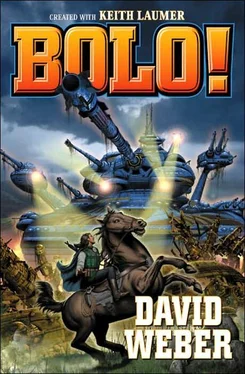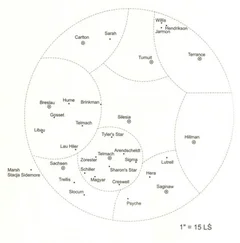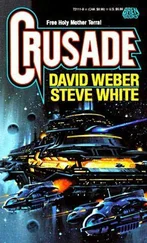And Humanity should have feared Melcon. It was Human hubris, as much as Melconian, which led to disaster, for both the Concordiat and the Empire had traditions of victory. Both had lost battles, but neither had ever lost a war, and deep inside, neither believed it could. Worse, the Concordiat’s intelligence organs knew Melcon couldn’t match its technology, and that made it arrogant. By any rational computation of the odds, the Human edge in hardware should have been decisive, assuming the Concordiat had gotten its sums right. The non-intercourse edict had succeeded in at least one of its objectives, however, and the Empire was more than twice as large as the Concordiat believed… with over four times the navy.
So the two sides slid into the abyss-slowly, at first, one reversible step at a time, but with ever gathering speed. The admirals and generals saw it coming and warned their masters that all their plans and calculations were based on assumptions which could not be confirmed. Yet even as they issued their warning, they didn’t truly believe it themselves, for how could so many years of spying, so many decades of analysis, so many computer centuries of simulations, all be in error? The ancient data processing cliche about “garbage in” was forgotten even by those who continued to pay it lip service, and Empire and Concordiat alike approached the final decisions with fatal confidence in their massive, painstaking, painfully honest—and totally wrong—analyses.
No one ever knew for certain who actually fired the first shot in the Trellis System in 3343. Losses in the ensuing engagement were heavy on both sides, and each navy reported to its superiors—honestly, so far as it knew—that the other had attacked it. Not that it mattered in the end. All that mattered was that the shot was fired… and that both sides suddenly discovered the terrible magnitude of their errors. The Concordiat crushed the Empire’s frontier fleets with contemptuous ease, only to discover that they’d been only frontier fleets, light forces deployed to screen the true, ponderous might of the Imperial Navy, and the Empire, shocked by the actual superiority of Humanity’s war machines, panicked. The Emperor himself decreed that his navy must seek immediate and crushing victory, hammering the enemy into submission at any cost and by any means necessary, including terror tactics. Nor was the Empire alone in its panic, for the sudden revelation of the Imperial Navy’s size, coupled with the all-or-nothing tactics it adopted from the outset, sparked the same desperation within the Concordiat leadership.
And so what might have been no more than a border incident became something more dreadful than the galaxy had ever imagined. The Concordiat never produced enough of its superior weapons to defeat Melcon outright, but it produced more than enough to prevent the Empire from defeating it. And if the Concordiat’s deep strikes prevented the Empire from mobilizing its full reserves against Human-held worlds, it couldn’t stop the Melconian Navy from achieving a numerical superiority sufficient to offset its individual technical inferiorities. War raged across the light-centuries, and every clash was worse than the last as the two mightiest militaries in galactic history lunged at one another, each certain the other was the aggressor and each convinced its only options were victory or annihilation. The door to madness was opened by desperation, and the planning study known as Case Ragnarok was converted into something very different. It may be the Melconians had conducted a similar study—certainly their operations suggested they had—but no one will ever know, for the Melconian records, if any, no longer exist.
Yet the Human records do, and they permit no self-deception. Operation Ragnarok was launched only after the Melconian “demonstration strike” on New Vermont in 3349 killed every one of the planet’s billion inhabitants, but it was a deliberately planned strategy which had been developed at least twelve standard years earlier. It began at the orders of the Concordiat Senate… and ended one hundred and seventy-two standard years later, under the orders of God alone knew what fragments of local authority.
There are few records of Ragnarok’s final battles because, in all too many cases, there were no survivors… on either side. The ghastly mistakes of diplomats who misread their own importance and their adversaries’ will to fight, of intelligence analysts who underestimated their adversaries’ ability to fight, and of emperors and presidents who ultimately sought “simple” resolutions to their problems, might have bred the Final War, yet it was the soldiers who finished it. But then, it was always the soldiers who ended wars—and fought them, and died in them, and slaughtered their way through them, and tried desperately to survive them—and the Final War was no different from any other in that respect.
Yet it was different in one way. This time the soldiers didn’t simply finish the war; this time the war finished them, as well.
– Kenneth R. Cleary, Ph.D. From the introduction to Operation Ragnarok: Into the Abyss Cerberus Books, Ararat, 4056
Death came to the planet Ishark in the two hundred and eighth year of the Final War and the one hundred and sixty-seventh year of Operation Ragnarok. It came aboard the surviving ships of the XLIII Corps of the Republic, which had once been the XLIII Corps of the Star Union, and before that the XLIII Corps of the Confederacy, which had once been the Concordiat of Man. But whatever the government’s name, the ships were the same, for there was no one left to build new ones. There was no one left to build anything, for the Melconian Empire and its allies and the Concordiat and its allies had murdered one another.
Admiral Evelyn Trevor commanded the XLIII’s escort from her heavy cruiser flagship. Trevor had been a lieutenant commander when the XLIII set out, and the escort had been headed by no less than ten Terra-class superdreadnoughts and eight Victory-class carriers, but those days were gone. Now RNS Mikuma led her consorts in a blazing run against Ishark’s spaceborne defenders—the ragged remnants of three Melconian task forces which had rallied here because Ishark was the only planet left to defend. They outnumbered Trevor’s ships by four-to-one, but they were a hodgepodge force, and what Trevor’s command had lost in tonnage it had gained in experience… and savagery. Ishark was the last world on its list, and it came in behind a cloud of decoys better than anything the defenders had.
There was no tomorrow for either commander… and even if they could have had one, they might have turned their backs upon it. The Human and Melconian races had hurt one another too savagely, the blood hunger possessed them both, and neither side’s com officers could raise a single friendly planet. The Humans had nowhere to return to even if they lived; the Melconians were defending their last inhabited world; and even the warships’ AIs were caught up in the blood lust. The fleets lunged at one another, neither worried about preserving itself, each seeking only to destroy the other, and both succeeded. The last Human Fleet units died, but only three Melconian destroyers survived to attack the XLIII, and they perished without scoring a single hit when the Bolo transports intercepted them. Those transports were slow and ungainly by Fleet standards, but they carried Mark XXXIII Bolos on their docking racks. Each of those Bolos mounted the equivalent of a Repulse-class battlecruiser’s main battery weapons, and they used them to clear the way for the rest of the ships which had once lifted four divisions of mechanized infantry and two of manned armor, eight hundred assault shuttles, fifteen hundred trans-atmospheric fighters, sixteen thousand air-cav mounts, and the Eighty-Second Bolo Brigade from a world which was now so much rubble. Now the remaining transports carried less than twelve thousand Humans, a single composite brigade each of infantry and manned armor, two hundred aircraft of all types, and seven Bolos. That was all… but it was sufficient.
Читать дальше












